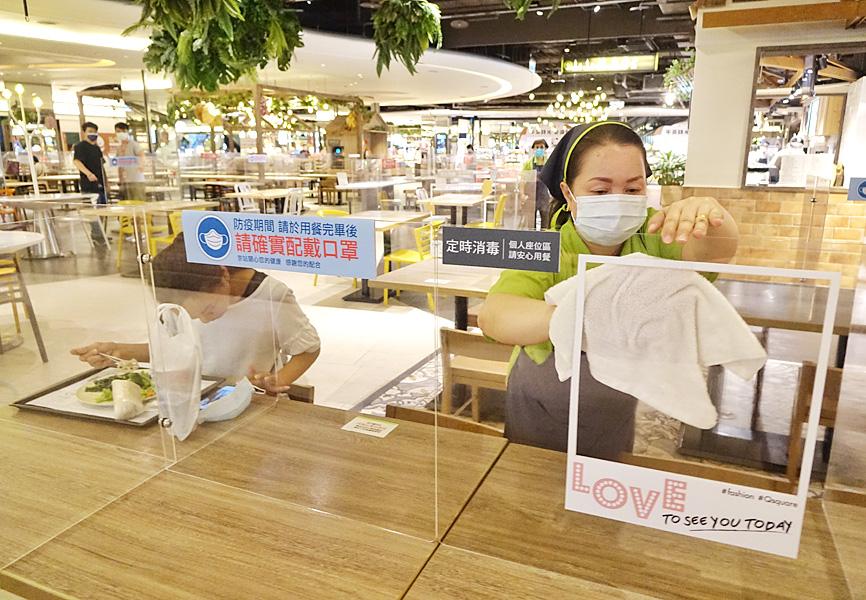Plastic dividers at indoor dining venues limit air circulation, which could aid the spread of COVID-19, a study by researchers in Taiwan, Israel and the US showed.
The study, published on Friday in the journal Science, said that respiratory pathogens such as COVID-19 can spread through small aerosols, which can float and travel in airflows and be trapped by plastic dividers designed to block droplet spray from coughs and sneezes.
Droplets or touch alone cannot account for the transmission of SARS-CoV-2 at superspreader events, which are instead likely a result of the movement of the virus in small aerosols, the study’s abstract said.

Photo: Liu Hsin-de, Taipei Times
Unlike droplets, aerosols can stay afloat for hours and move up to 1m to 2m, which is farther than guidelines for social distancing mandate, National Sun Yat-sen University said in a statement yesterday, citing the study’s first author, National Sun Yat-sen University associate professor Wang Chia-chen (王家蓁).
Small aerosols of about 5 micrometers could be inhaled through the nasal cavity and into the upper respiratory system before infecting the bronchi or alveoli in the lungs, Wang said.
COVID-19 test kits, which mainly rely on sampling the nasal cavity, cannot detect the virus in the early stages of infection in the lungs, she said.
While aerosols can carry the virus over long distances, the density of virus-bearing aerosols in the air also increases with proximity to an infected person, which means that aerosols become more infectious at close range, she said.
Most social distancing protocols were designed to counter a virus that spreads through droplets and contact, not aerosols, which helps to explain COVID-19’s persistence, she added.
The study called for measures that mitigate aerosol transmission, such as ultraviolet light disinfection, air filtration and improved ventilation, the study’s abstract said.
Plastic dividers installed in many dining venues and public facilities block droplets, but also reduce air circulation, which increases the dangers of aerosols, the university said.
Citing the study, it said that the government should seek to improve indoor air circulation, install high-efficiency particulate absorbing filters and use ultraviolet lights at indoor facilities to counter aerosol transmission.
These measures should be used along with mandates for wearing masks, social distancing and limits on group gatherings, it added.

Costa Rica sent a group of intelligence officials to Taiwan for a short-term training program, the first time the Central American country has done so since the countries ended official diplomatic relations in 2007, a Costa Rican media outlet reported last week. Five officials from the Costa Rican Directorate of Intelligence and Security last month spent 23 days in Taipei undergoing a series of training sessions focused on national security, La Nacion reported on Friday, quoting unnamed sources. The Costa Rican government has not confirmed the report. The Chinese embassy in Costa Rica protested the news, saying in a statement issued the same

Temperatures in New Taipei City’s Sindian District (新店) climbed past 37°C yesterday, as the Central Weather Administration (CWA) issued heat alerts for 16 municipalities, warning the public of intense heat expected across Taiwan. The hottest location in Taiwan was in Sindian, where the mercury reached 37.5°C at about 2pm, according to CWA data. Taipei’s Shilin District (士林) recorded a temperature of 37.4°C at noon, Taitung County’s Jinfeng Township (金峰) at 12:50 pm logged a temperature of 37.4°C and Miaoli County’s Toufen Township (頭份) reached 36.7°C at 11:40am, the CWA said. The weather agency yesterday issued a yellow level information notice for Taipei, New

Taiwan’s Liu Ming-i, right, who also goes by the name Ray Liu, poses with a Chinese Taipei flag after winning the gold medal in the men’s physique 170cm competition at the International Fitness and Bodybuilding Federation Asian Championship in Ajman, United Arab Emirates, yesterday.

A year-long renovation of Taipei’s Bangka Park (艋舺公園) began yesterday, as city workers fenced off the site and cleared out belongings left by homeless residents who had been living there. Despite protests from displaced residents, a city official defended the government’s relocation efforts, saying transitional housing has been offered. The renovation of the park in Taipei’s Wanhua District (萬華), near Longshan Temple (龍山寺), began at 9am yesterday, as about 20 homeless people packed their belongings and left after being asked to move by city personnel. Among them was a 90-year-old woman surnamed Wang (王), who last week said that she had no plans